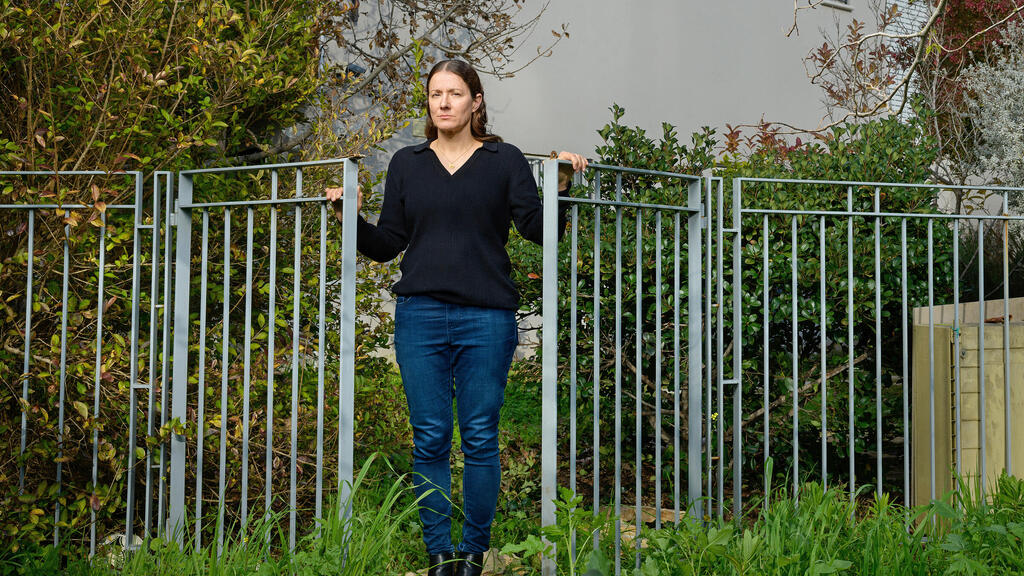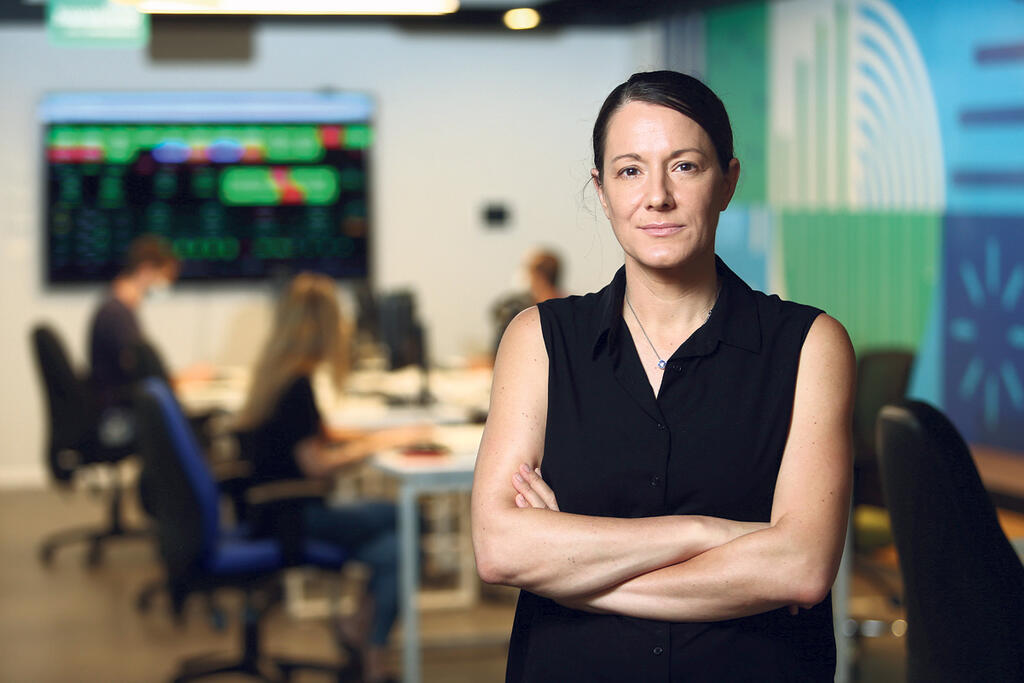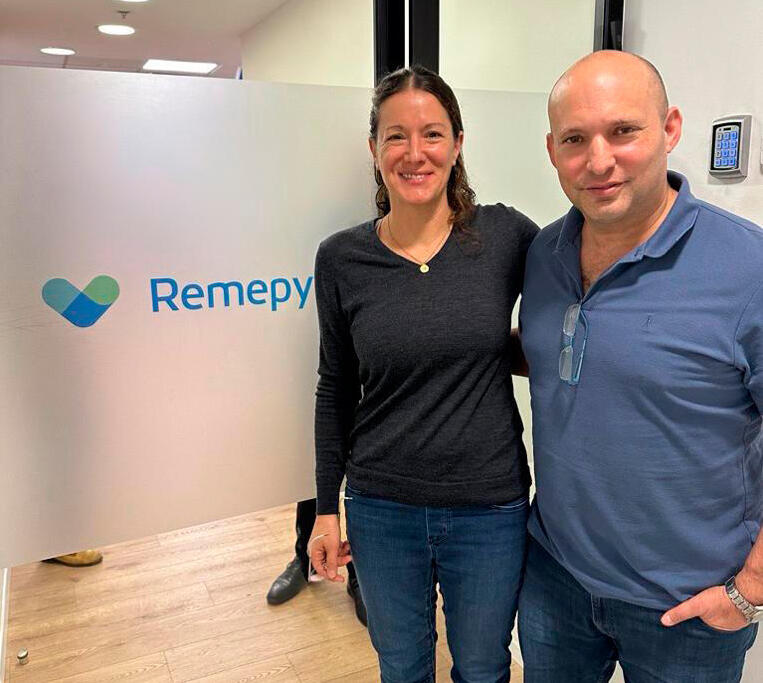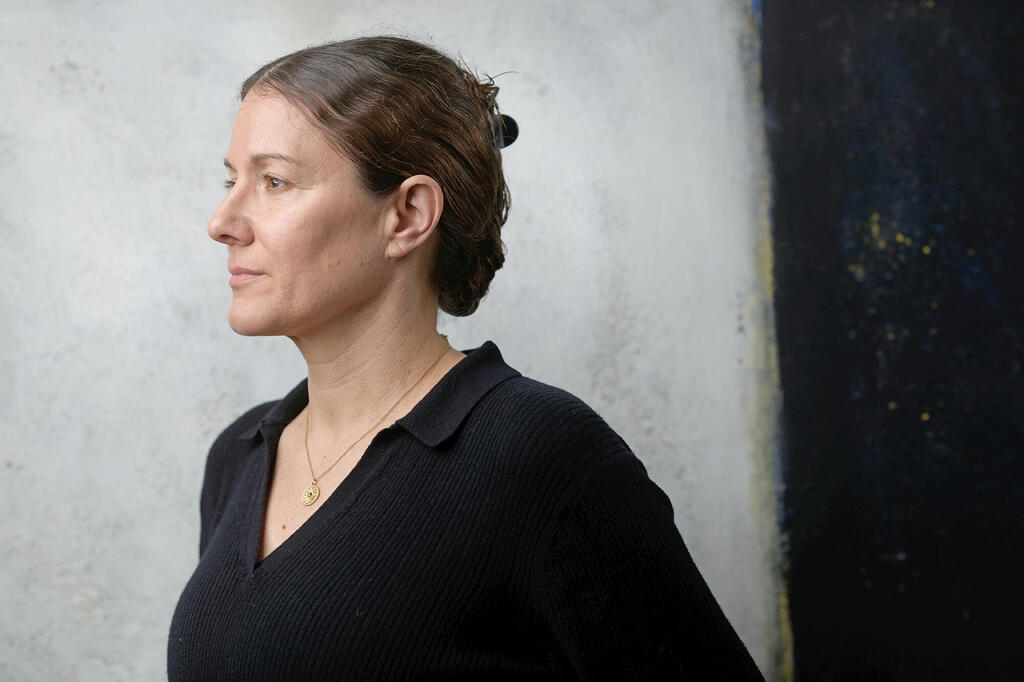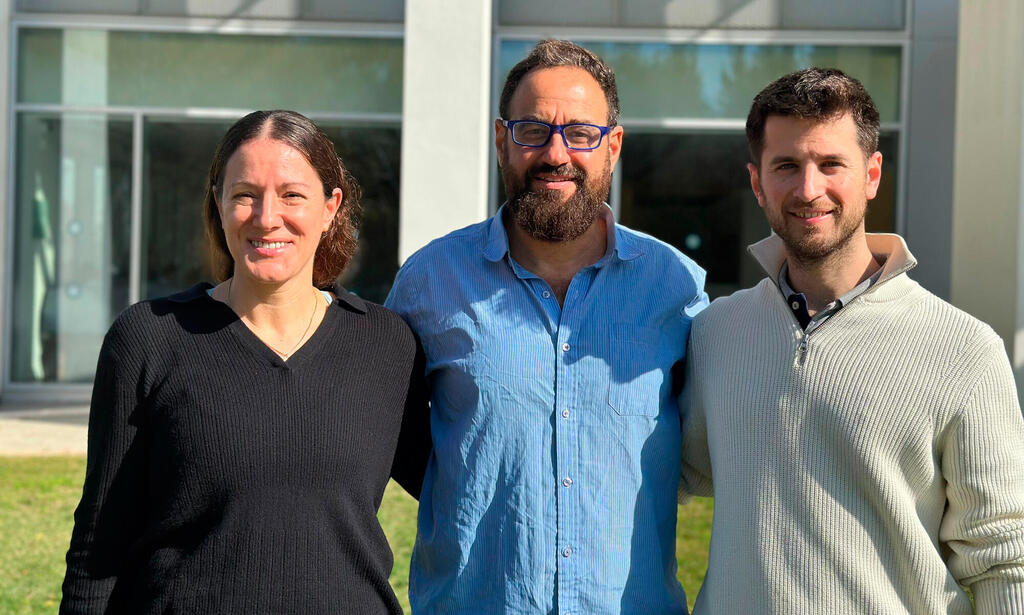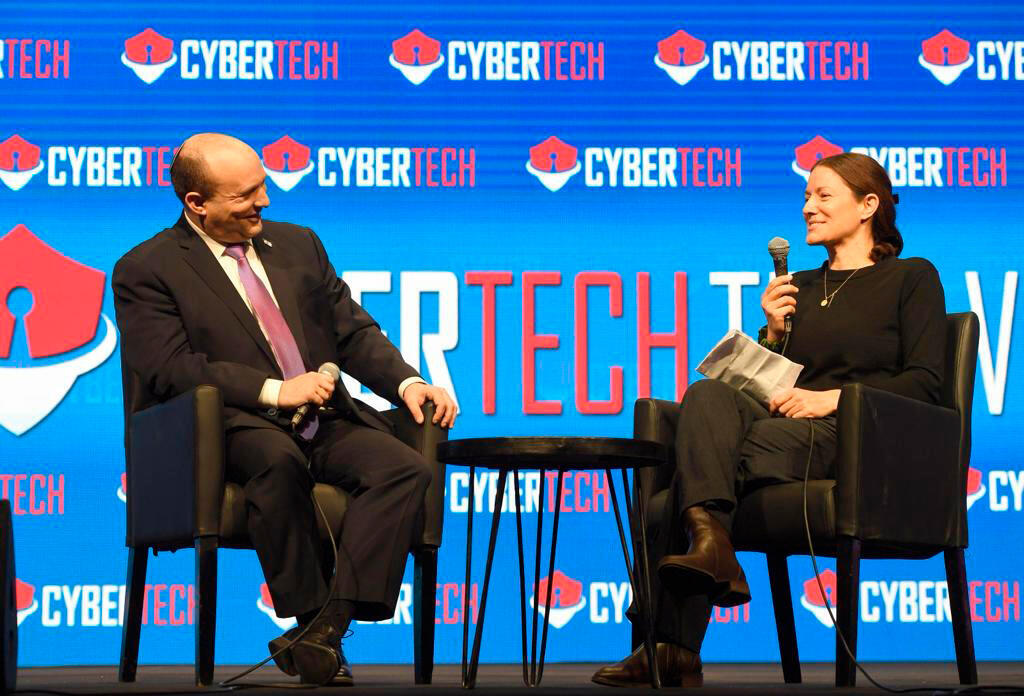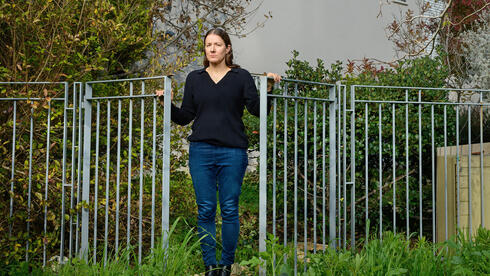
"Until there is unity and equality here, Israel has no chance"
At night, serial entrepreneur Michal Tsur doesn’t sleep, worrying about her son fighting in the army. During the day, she is busy with her third startup, Remepy, and dreaming of a new country - the same country for which she took to the streets as one of the leaders of last year’s protest against the judicial reform
Michal Tsur met with me after yet another sleepless night. We sit in the sun and everything around us seems almost normal. Tsur can’t stop checking her cell phone. The morning headlines report on a complex operation to rescue two captives and the deaths of two Maglan soldiers, Adi Eldor and Alon Kleinman. Her son is also a soldier in Maglan. Initial reports of casualties had already circulated among the families of Maglan soldiers overnight, including to the Tsur family, none of whom were able to sleep. Now, the morning after, she thinks about her son, about the funerals he’ll have to attend, and about all the other funerals he’s attended since October 7.
The difficulty sleeping is not just physical, but also metaphorical. Tsur, 50, “woke up” this past year, and ever since she’s experienced more and more wake-up calls. In the business and technology world, she's been a familiar figure for years, one of Israel’s prominent serial entrepreneurs. But the general public became acquainted with her mainly as one of the leaders of the high-tech industry’s protests against the government’s judicial overhaul last year. In July, she even gave an emotional speech on stage at a demonstration in Kfar Saba. Even then, she worried about her son. She said that she couldn't sleep because he was fighting in Jenin and spoke about the pain of losing soldiers in the wake of the government's actions, and about the urgent need to fight for the country. Now, more than half a year later, everything feels more acute - the anxiety, the pain, but also her insights and determination to fight.
"Until there is unity and equality here, we have no chance. This country has no chance," she says now. "If the ultra-Orthodox can sit next to me in business class on flights, they can also serve in the IDF. Why does only my son have to take risks?"
She is articulate and composed, neither angry nor accusatory, but her sadness and concern is clear along with her efforts to channel her personal perspective into a broader national one that could change reality. Her entrepreneurial spirit is always looking for action.
"What will sustain this country in the future? My doctorate focused on evolutionary game theory. I'm not an expert, but it's clear that if the whole country behaves as the Haredi population does, there won't be anything left here. If we liken the country to a business, then there's a board here whose directors take money from the treasury and give it only to some employees. This board has clear conflicts of interest, but everyone sits around the table and watches without doing anything. This conduct weakens Israel as a state, and even the Haredi sector itself understands that. When will we finally make a change?"
When indeed?
"According to game theory, it should have happened long ago."
Why hasn’t it happened? Are the Haredim not rational actors?
"They actually are, but there's a leadership problem. In recent months, I've had the opportunity to meet many from the Haredi and national-religious communities, and I've come to realize that most of the people themselves are not extremists - it's the leaders. The public wants unity, to serve in the army, to work. After all, 18-year-old kids don't want to sit and study - they want to go out. I think forces from within the Haredi community will rise from the ground up much stronger than people think."
And it's precisely in this reality that you are now launching your third startup, and in Israel, not abroad.
"I'm doing this because I'm optimistic. If you're not optimistic, you give up. In my view, pessimistic people are losers, they're used to losing."
“This country is managed like a startup, not like a mature company"
In recent months, there were those who wondered if Tsur would make her way into politics, after it became clear that she was parting ways with her latest successful venture, Kaltura. Some even thought she would join forces with her former co-founder of Cyota, Naftali Bennett. Instead, last week the former prime minister joined the board of Tsur's new startup, Remepy, focusing on hybrid drugs. This is the third high-tech board Bennett has joined recently after joining the boards of quantum computing company Quantum Source and AI cyber company Lassoo Security.
You founded Remepy here, but registered it in the United States. You did the same with Cyota and Kaltura, but it seems this time the decision has additional implications.
"Yes, it's related to the current situation in Israel. It was always easier to raise money for a company not registered in Israel, and this is even more true for a company operating in the conservative field of drugs and appealing to more conservative investors who were always reluctant to invest in Israeli companies, even during times of positive attitudes towards Israel. And now, in general, it's not a good time to raise money, not just for startups, but also for Israeli funds."
Because of the war?
"The war affects attitudes because the country is not perceived as very safe and strong, and it's also becoming clear that our intelligence capabilities are not so amazing. But even before that, there was the judicial coup, and anyone who thought Israel was the only democracy in the Middle East discovered that its democratic foundations are shaky. And if that weren’t enough, until recently we thought we at least had a strong economy, but now we have a finance minister who understands nothing and believes in a higher power."
And the world has discovered this as seen by Moody’s downgraded rating.
"Your average person doesn’t understand the issue of the rating; it doesn't interest them and in the short term it won't affect their lives. But this is a certificate of failure for the government. In the short term, the economy and the country will survive, but in order for there to be a resurgence in the years to come, we must deal with the foundational infrastructure on which the country was built."
And by infrastructure, you mean…?
"In high-tech we're good at identifying both problems and opportunities. Now there's a huge opportunity, and what has been revealed since October 7 is that there's an amazing civil society here, and most segments of the public get along with each other - the problem is the leadership. There's a disconnect between the public and our leaders. I'm married to a professor of American history (Prof. Eran Shalev), who talks a lot about how the U.S. adopted a constitution early on, and that is what’s missing here: the legal infrastructure that defines citizens' obligations to the state and the relationship between institutions."
Does the public recognize these problems, in your opinion?
"The polls don't lie. There's a very high level of dissatisfaction with the leadership. It doesn't matter if Benny Gantz at the moment commands the greatest number of seats or someone else; what's clear is that people are not satisfied with the current leadership. Bezalel Smotrich, for example, wouldn’t pass the threshold [to enter the Knesset]. Most of the people in leadership today are not statesmen - they are power-hungry. I used to be naive; I thought most people are good, but they're not."
What does that mean?
"I thought in my naivete that it was possible to appeal to the hearts of politicians, that they really care about all the citizens of this country. In my personal journey, the most essential element was who my partners were, in family, in business and entrepreneurship. At the state level, I look a lot at what makes the tech industry so successful and it’s this shared goal that everyone is focused on achieving. That's what's missing in the political leadership."
Non-statesmanlike politics serves the survival of the government. The Bennett government did not survive by being statesmanlike.
"Bennett is ultimately one of the few who were statesmen, and today people understand that and you see it in the polls. With Bennett it isn’t a question of right or left, but a matter of values. For example, I always had ideological disagreements with him, but we've never had differences in values."
Bennett himself told Calcalist that, "Israel is in one of the toughest periods it has ever known. After the disaster of October 7th and the difficult year that preceded it, we need a new political-economic-social vision. I am confident that high tech will play a big part in it, and it will assist in rebuilding Israel's brand in the world."
He added: "I have no doubt that Israeli innovation in the field of digital health can and should be a model of excellence. Remepy can do to the pharmaceutical world what Cyota did to the world of banking, which has a similar fear of change."
"The state and economy will weaken, people will leave"
The mobilization of the tech industry during last year’s protests against the judicial reform raised expectations that some would enter politics, but Tsur says that doesn't seem to be happening: "Generally, it would make sense for the protests to translate into political power. There were organizations that made great efforts to understand Israel's problems and how to solve them. Many people in tech invested a lot of time thinking about what needs to change in the country. After all, you can find parallels - tech companies reinvent themselves every time reality changes. Take, for example, the revolution they underwent with the advent of cloud computing - until recently, all the computer infrastructure of tech companies was physical, but reality changed, and they knew to move to the cloud. Israel also must undergo a drastic change in infrastructure and restart."
But, practically speaking, are there high-tech leaders moving into politics?
"There's a high-tech forum operating in the Knesset all the time. Keren Levi, until recently the president of Payoneer and a colleague of mine, who was part of Cyota, is very active there. But what's great about tech is that you don't have to be confined to a framework, and everyone knows how to work independently. When I identified a certain issue that interested me, I conducted an independent survey. When I felt the need to go to Jerusalem and attend the Knesset, I went. We are people who take initiative and know how to raise issues independently. We don't need to ask permission from anyone."
What independent survey did you conduct?
"At the beginning of the judicial coup, I was very concerned about its impact on tech. So, in the first weeks, I conducted a survey across hundreds of investment funds and entrepreneurs, and it showed that no one wanted to be associated with Israel and that they were withdrawing their money. I was still naive and I met with the Economic Affairs Committee chaired by David Bitan. I thought the data was really interesting, but I saw that it didn’t interest them, and I became disillusioned. Later on, we proposed compromises, and nobody took these proposals seriously either."
Individual entrepreneurs building projects might work for the startup scene, but to shape policy you need an organization.
"I believe that dissatisfaction with the leadership will manifest itself in various ways in the coming months. There will be a different kind of politics here, something for the good of the entire country and not for the benefit of specific sectors. One of the roots of the problems in our system is the lack of term limits, primarily for the Prime Minister, but also for ministers. If there were such a limit, we wouldn't have gotten to this situation. This is part of the change in the country's infrastructure that must happen."
In August, you told Calcalist that the civil war had already begun. Now we are in a lull, but will it resume once the war in Gaza is over?
"The war in Gaza united the people. Today, there are many brave leaders from the national-religious sector, there is significant work in places like the Genesis Forum, of which I am a part. We are calling to find common ground and start building together, so that major changes will be made with agreement. If unity does not emerge from the current situation, the country has no chance."
"The state will weaken, the economy will weaken, people will start moving their assets elsewhere and leave. It's already happening - academics who were supposed to return to Israel are not coming back. Many tech people I know have left."
Will we turn into Argentina?
"Argentina has the luxury of not being surrounded by hostile countries, and it has natural resources. The only natural resource Israel has is brains."
Given the serious concerns you present, the question arises again why you are not going into politics.
"The past year was the end of a period at Kaltura, a year of contemplating what to do next. I will support Naftali in whatever he does, but I'm not going into politics. I know how to build things, I help any initiative that promotes change that will give Israel a chance and secure the future of the country. If we don't build more companies and don't create more tech, the economy will collapse."
“A PhD in neuroscience"
Tsur was born in Jerusalem, completed a bachelor's degree in law and economics, and went on to obtain a doctorate in mathematics at NYU and a postdoc at Yale before starting to found companies. She co-founded Cyota in 1999 alongside Naftali Bennett, Ben Anosh, who she went to high school with and who served with Bennet in the army, and Lior Golan, Tsur's then-roommate, a graduate of Talpiot and the group's leading technologist. Cyota developed software to prevent financial fraud.
"It was a wonderful journey, for all of us it was our first attempt to build something," says Tsur. "Suddenly you realize that you can build something amazing in a short time - that's the beauty of technology."
7 View gallery
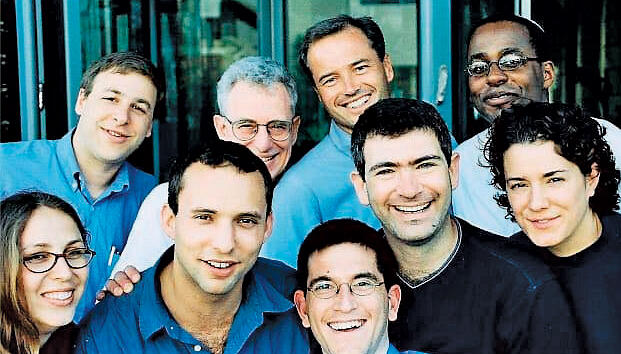

The founders of Cyota including Naftali Bennet, third from left, and Michal Tsur, far right.
(Credit: Cyota)
In 2005, the company was sold to American security giant RSA for about $145 million, and the group dispersed, but the tools it developed remained central to the industry. For example, when you're about to make an online transaction and are required to answer identification questions like "What was your childhood pet's name?" this is due to Cyota.
After the exit, Tsur founded Kaltura, which produced video management software for universities and other large organizations, where she remained for more than 15 years. "I led the product, the platform, the marketing. Everyone knows that I love building new things and that I'm less of an operator by nature. Yet I stayed even after two other founders left, leaving only Ron [Yakutiel] and me. We're like a married couple."
Kaltura, which at its peak employed 600 people, became one of the first Israeli unicorns, when in 2021 it went public on Nasdaq at a valuation of about $1.3 billion. The COVID-19 pandemic helped the company, but then there was an economic slowdown and layoffs. It is now traded at a value of about $220 million but still sells for about $170 million a year, including to giants such as Bloomberg and Berlitz.
Kaltura enjoyed great success, but when you tried to go public at a valuation of $2 billion, you failed, and only on the second attempt did you go public at a lower value. During the pandemic, you flourished and then you contracted. In hindsight, did you make errors along the way? Maybe you shouldn't have gone public but been acquired instead? Or should you have left earlier?
"I look at it as an entrepreneur: what interests me is that I built a product that reaches many users. This happened with Cyota and also with Kaltura."
If it's a good product that reaches many users, why doesn't Kaltura grow more?
"During COVID-19, it grew very fast; the growth rate reflected the adoption of video in organizations. And now there are new products that will give another boost to growth." Kaltura's growth also benefited Tsur personally. In the IPO, she sold shares worth $9 million and still holds shares worth about $10 million.
You've been successful. You could rest, or devote yourself only to public service. Why do you need another startup?
"I still have an itch to scratch - the field of science. Amir Amedi, my partner in founding Remepy, jokes that I'm now doing a PhD in neuroscience on an accelerated track. In the past two years, I've read a tremendous amount of scientific articles, I took an ultrasound technician course to better understand the human body, I've already scanned all family members," she laughs. "Most of the people I meet in the startup circle anyway think I'm a doctor because I have 'Dr.' before my name."
Tsur also knows Amedi from high school. Prof. Amedi (the cousin of singer and actor Idan Amedi) heads the Brain and Imaging Research Institute at Reichman University. They were joined by Or Shoval, a 28-year-old veteran of Sayeret Matkal, who Tsur says reminds her a lot of a young Bennett. The venture took shape below the radar for a year, raised some funds from Insight Partners and Samsung Next, and currently employs 15, most of them scientists.
"I wish that the government surrounded itself with as many experts and scientists as we do," says Tsur. Others involved in Remeply include neuroscientist Prof. Michal Schwartz, winner of the Israel Prize for Life Sciences; senior ophthalmologist Prof. Itai Chowers; lawyer Dr. Ofer Tur-Sinai; and psychologist Dr. Nira Saporta, who worked with Tsur both in Cyota and Kaltura.
"Ventures should start with solving problems, but for me, they always start with people," says Tsur. "Companies always go through many changes along the way, and the initial product is not the product they bring to market in the end, but the people remain."
Remepy began from a very personal place. While Amedi came to the idea of hybrid medicines as a world-renowned scientist who studies how damage to one sense affects other senses, Tsur became interested in the subject because of her father who went blind at a young age due to a genetic disease. She closely observed how the brain "compensates" for any damage. "I connected with Amedi, his research interested me. In these studies, blind people received higher scores in memory exercises, with the assumption that they need to strengthen this 'muscle' in order to navigate their environment," she says. "At the beginning of the journey, we looked at Alzheimer's and wanted to see how we could strengthen brain activity. From there, we came up with the idea of creating a breakthrough in treatment through hybrid drugs."
According to Tsur, a hybrid drug is actually based on a kind of "digital molecule." Alongside using traditional medicine, the patient is required to use an application every day and adhere to certain exercises that can significantly boost the effectiveness of the drug they are taking. This is a field that is just beginning to develop, and people haven't really started using it yet, but its potential in a world increasingly focused on preserving, improving, and restoring cognitive skills is enormous.
"Many industries have undergone a revolution due to the integration of software and applications, but in medicine this hasn't happened at all. For many diseases, especially neurological diseases, there is data indicating that combining drugs with aids enhances their effect or allows for dosage reduction, but this isn’t accessible for most people," explains Tsur.
In an attempt to make it accessible, Remepy - like many life sciences companies at the beginning of their journey - is currently aiming in several directions. In addition to dealing with neurological diseases, the company has already presented initial evidence that an application it developed can reduce anxiety and depression among cancer patients receiving immunotherapy treatment and has moved on to the second stage of the clinical trial, based on the understanding that stress levels in patients affect the immune system and therefore also the effectiveness of treatment that is based on that system. At the same time, it is exploring possible applications for ADHD and degenerative eye diseases.
The company's biggest challenge will be to enter the old, giant, and highly competitive market of pharmaceutical companies. Remepy is targeting generic drug manufacturers rather than original drug manufacturers, who are protected by patents and enjoy high pricing and may be less motivated to improve the effectiveness of their drugs or reduce their dosage.
In the case of generic drugs, the competition is more vigilant, and the use of an application that enhances the drug may be more attractive. In any case, Tsur believes that ultimately, the whole market will go in this direction. "It may sound futuristic, but it's just like the auto industry: today, you don't buy cars that don't have a software component like Mobileye’s, which improves driving safety. That's also the future of the drug market - there won't be drugs without an application. When established tech companies enter the pharmaceutical industry, as they plan to, it will give a huge boost to this market. If I were Amazon, I would enter the market through hybrid drugs."









